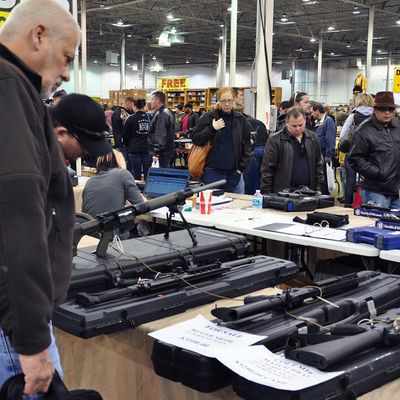
America’s background check system for gun sales is blatantly, flagrantly, ostentatiously flawed. It only applies to purchases made from licensed gun dealers, as opposed to those at gun shows or from some guy on the Internet, a loophole more gaping than the Goatse anus. President Obama and Democrats in Congress are trying to close it by expanding background checks to all sales, and a full 91 percent of Americans back them in this effort, which is pretty much the first time that 91 percent of Americans have ever agreed on anything. But, incredibly, many Republicans in Congress don’t support universal background checks and have offered a number of explanations for why it’s a bad idea. As you will see, all of them are terrible.
We should enforce the laws we already have, not make new ones.
In February, 23 House Republicans signed a letter declaring that it is “imprudent to simply call for more laws, without examining the efficacy of the current laws.” They point out that, according to an official Justice Department report, 76,142 permits were denied in 2010, with 4,732 cases being “referred to field offices for investigation. However, only 62 prosecutions resulted from these actions.” This figure is correct, but irrelevant.
There are a few things that can get a prospective gun buyer in trouble after filling out a background check. He can lie on his application, for example. If he’s trying to sell a gun to a pawn shop (these sales can be subject to background checks), he can be found to be owning his gun illegally. He can be a fugitive. But simply failing a background check isn’t illegal, so most permit denials don’t and shouldn’t result in prosecution of any kind.
The salient figure in the statistic cited in the GOP letter is that 76,142 permits were denied in 2010. That means 76,142 guns didn’t go into the hands of felons, the mentally unstable, people under a domestic violence restraining order, or others who society has decided should not be allowed to own a gun. This happens to be the primary purpose of background checks, not hunting down people who lied on their applications.
Background checks will lead to some kind of Big Brother–y national gun registry.
Utah senator Mike Lee, to take but one example, says that background checks will be “accompanied by some sort of registration system” and that Americans “are not really comfortable with the idea of the government knowing exactly what firearm they purchase any more than they would be comfortable with the government knowing when or how often they go to church or what they eat for breakfast or what books they are reading from the library.”
In fact, though, there won’t be any kind of national gun registry (the White House has said Obama doesn’t support it), and the government won’t know what kind of gun you’ve purchased. According to current law, the government destroys records of gun sales in 24 hours and that’s not going to change.
It is true that under the leading current proposal, private gun sellers who would come under the scope of universal background checks would be required to keep a record of their firearm sales. Oklahoma senator Tom Coburn has said that he believes this would put us on a slippery slope to a national gun registry. But under the Gun Control Act of 1968, licensed gun dealers — like a gun shop or Walmart, for example — have been required to keep records of gun sales for twenty years, and over four decades later, it has yet to lead us down a slippery slope to a national gun registry. That doesn’t seem very slippery.
Criminals don’t care if their guns are bought legally.
“Criminals don’t respect the law,” John Boehner said recently, discussing universal background checks. “It will have no effect on them.” As we’ve written before, this makes literally no sense. The background check system doesn’t ask criminals to operate on the honor system. It puts the onus on gun dealers — law-abiding business owners who don’t want to break the law by selling a gun to someone who’s not allowed to own one.
Another way of interpreting Boehner’s remark is that a criminal who wants a gun will find a way to acquire one outside of the scope of the background check system. That may be true in many cases, but does that mean we should make it easier for them? A terrorist may be able to procure anthrax on the black market, but it’s a lot harder than buying it with a credit card at the local biological warfare show.
Implicit in Boehner’s theory that criminals will just find a different way to acquire guns is that criminals right now are buying guns at gun shows and from private sellers. That seems like a pretty good argument for expanding background checks to cover those sources.
A background check wouldn’t have stopped the Newtown massacre.
“Nothing we’re talking about would have prevented Newtown from happening,” South Carolina senator Lindsey Graham said over the weekend. “The guy did not fail a background check.” It’s true that a background check would not have kept Adam Lanza from getting his guns, but it’s also completely beside the point. Newtown may have shocked Washington (some of it, at least) into revisiting gun laws, but the objective now is to stop future gun violence, not prevent an incident that already happened. What was Graham saying about port security after 9/11? “Don’t waste your time, the hijackers used airplanes and box cutters”?





























